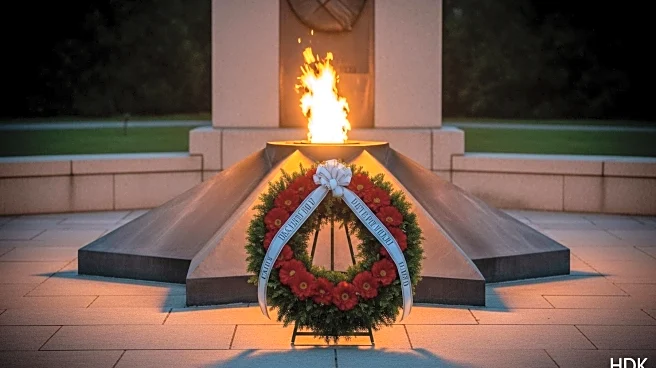What's Happening?
Prime Minister Benjamin Netanyahu has publicly affirmed his personal recognition of the Armenian Genocide during an appearance on Patrick Bet-David's podcast. The discussion arose when Bet-David, who is of Armenian descent, pressed Netanyahu to personally acknowledge the Ottoman Empire's massacre of Armenians between 1915 and 1917 as genocide. Netanyahu responded affirmatively, stating, 'I just did.' This statement follows the recent passage of a bill by the Knesset, Israel's legislative body, which officially recognizes the massacre as genocide. The acknowledgment by Netanyahu adds a personal dimension to the official stance taken by the Israeli government.
Why It's Important?
Netanyahu's personal recognition of the Armenian Genocide is significant as it reflects a broader trend of international acknowledgment of historical atrocities. This move may influence diplomatic relations, particularly with countries that have been hesitant to recognize the genocide due to political considerations. For Israel, this recognition could strengthen ties with Armenia and other nations that have acknowledged the genocide, while potentially straining relations with Turkey, which has historically denied the genocide. The acknowledgment also highlights the importance of historical memory and the role of political leaders in shaping narratives around past events.
What's Next?
Following Netanyahu's statement, there may be increased diplomatic engagement between Israel and Armenia, potentially leading to stronger bilateral relations. Additionally, Turkey's response to this recognition will be closely watched, as it could impact Israel-Turkey relations. The international community may also see this as a precedent for other countries to follow suit in recognizing the Armenian Genocide, potentially leading to a broader shift in global acknowledgment of historical events.
Beyond the Headlines
Netanyahu's recognition of the Armenian Genocide underscores the ethical responsibility of political leaders to acknowledge historical truths, even when they may have diplomatic repercussions. This development may encourage other leaders to confront difficult historical narratives, promoting a culture of accountability and reconciliation. The recognition also serves as a reminder of the ongoing struggle for historical justice faced by many communities worldwide.









